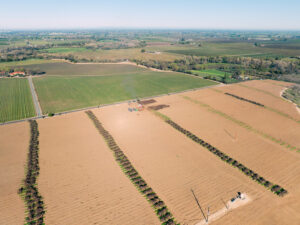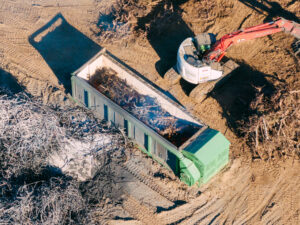Growing Together Fall 2024
Farm Development Team Pivots to Vineyard Removal Innovation
Being members of the Waterford High School Wildcats football team would wind up paying off big for brothers Zach and Garrett Fowler.
After graduating and earning a degree in agricultural business, Garrett went to work managing nut production and processing for their former high school football coach. Meanwhile, Zach was an aspiring firefighter who attended the fire academy and fulfilled his dream of fighting fires, a job that enabled him to operate equipment on their coach’s operation on his days off. Here they were, two young professionals who’d grown up in an agricultural area but didn’t themselves have deep farm roots, now working the land on a local farm operation owned by their football coach. It was a much different type of Xs and Os than on the gridiron. Then, one day, it all clicked.
“I’d been working there for about a year. One day, my brother said ‘Why don’t we rent a backhoe and do some more work?’ A couple months later, we were doing some land development on 40 acres of new ground and we had people stopping and asking if we’d run dozers for them too. That’s how we started doing custom work: a dozer and a side job,” Zach said. “We’d split shifts and run 24 hours a day, then started slowly getting more jobs and acquiring more equipment.”
One of an array of farm development and management services
So were the early days of Fowler Brothers Farming, a partnership between the two brothers who today work with local growers for permanent and row crop development and management in addition to building their own acreage over time, now operated as Ag Land Partners. Their land development services now range from orchard and vineyard removal to deep ripping, chiseling, laser leveling and tree planting.

Though there’s been consistent demand for these and other land development services since the Fowler brothers started in 2012, one in particular has taken off. With the supply-driven slowdown in the wine grape market in much of the region in recent years, the Fowlers have seen demand for air curtain burning skyrocket. The equipment — unique in the region to the brothers’ business — was a more recent addition to their machinery fleet born out of innovation to meet a new need.
“We started getting calls from vineyard growers — two or three a week — wanting to remove vines at the beginning of 2023. But they couldn’t get a burn permit, so they would ask if we could grind them. Being farmers ourselves, we set out to find a solution and we found out about a company in Florida with air curtain burners or incinerator boxes. No one had tried it around here,” Zach said. “There were one or two in the state, and Cal Fire had them. We decided we wanted to try it out but we really couldn’t rent one. So, we bought one and had it shipped here in July 2023. It’s been a game-changer for us, and we’ve been running it nonstop since last July.”
Meeting vineyard removal demand with new tools
What the Fowlers have done to add air curtain burners to their equipment fleet embodies taking something of a leap of faith in an effort to “figure out a new way to do business,” said Grow West PCA Dan Bonetti. He works in Yolo, Solano, Napa and Sacramento counties and serves as the Fowlers’ PCA on the acres on which they grow their own crops.
The burners — about the size of a semi-truck trailer — are placed at the edge of a vineyard being removed. Once vines are taken out and placed in windrows, they’re loaded into the burner with a front-end loader. Incinerating the vines cuts the cost of removal and cuts the environmental footprint of the process to 2%–3% of conventional removal methods. State grant funding provides growers around $1,400/acre to use the air curtain burners for vineyard removal, with some of that money paying for the Fowlers’ work.
“They’ve capitalized on grant funding and are helping growers utilize that funding while making money on it too. The air curtain burner was part of their original plan; when land development work started to dry up, they pivoted,” Bonetti said. “What they do is pretty unique. I think it’s great to spotlight what people like Zach and Garrett are doing to innovate in a down market and figure out new ways to do business.”
What it takes to use an air curtain burner to remove a vineyard
Today, the Fowlers have four air curtain burners that operate between Sacramento and Bakersfield. With up to 70,000 acres of grapes that may be coming out to balance out supply and demand so the market normalizes, the 6–8 acre/day pace means they’ll be busy for a few more years.
“Growers have to prove their properties meet the criteria for the state grants, then the customer has to prove they paid the contractor to get that funding,” Zach said. “It works out really well because an air curtain burner can work where other methods can’t. It has some big benefits for growers.”

The Fowler brothers have turned to a practical yet innovative solution to a problem growers have faced in recent years, and they’re likely to see a lot of business because of it through the next two to three years. It’s an example of “being on your toes” and being ready to pivot in order to generate new business in the land development sector. As vineyard removal work starts to slow down, Zach is confident he and his brother will find the next job to do for area growers.
“If we can build something together like this and help people out, it’s just better for the agriculture industry itself. I always encourage people to get involved and try new things,” Zach said. “If you’re honest and do good work, it should speak for itself. You’re always going to have naysayers. But if I can lay down at night and know I did the right thing that day, that’s what it’s all about.”
Practical innovation born of necessity
That sort of philosophy of innovation is to Bonetti what enables growers to make ends meet when markets aren’t as favorable for growers and businesses that support them.
“It’s not really a matter of throwing things against the wall to see what sticks. Make sure whatever you do works financially,” Bonetti said. “What the Fowler brothers are doing is practical innovation that’s meeting a need, even if it requires taking a bit of a risk. They’ve made a business out of something that wasn’t even in this part of the country before them.”
